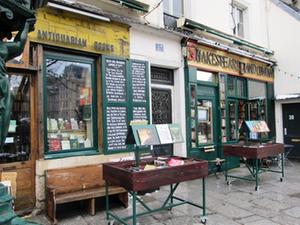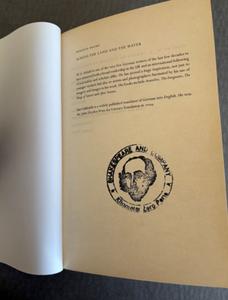Here's a story we all can tell; the variations are nearly infinite. It's a tale about finally making a pilgrimage to the bookshop that has been on your "must visit" list for a long, long time. It's about being there, browsing the stacks, buying a book or two or three; savoring the moment and then, years later, being able to recall that moment at will.
If you're reading this, you've had the experience. I know you have. Tell me about it sometime. What was your "must-visit" bookshop pilgrimage like?
A couple of things triggered thoughts about this recently. The first was an article ("Why I always visit a local indie bookstore on my travels") I read in the Straits Times. "I always plan a visit to a local independent bookstore early into my travels to find my bearings and pick up a book related to the place," Shawn Hoo wrote. "A city without bookstores is a nightmare for a traveler like me--it is like visiting a city without maps."

Biles opened the program by wondering, "when a volume chosen from a million-strong catalog can be fired through your window by a drone barely an hour after you've ordered it, or when the very same book, searchable, resizable, updatable, shareable, can appear on your e-reader in a matter of seconds, what good do the dusty, inefficient, brick-and-mortar relics we call bookshops still serve?"
A conversation starter if there ever was one, and the panel's discussion is well worth a listen, but a slightly off-topic comment during the q&a sent my mind in another direction.
A woman mentioned that the last few times she'd been in Paris, she wasn't able to get inside Shakespeare and Company due to the long queue: "I'm wondering how you manage the fact that you are essentially a tourist landmark/bookshop between the sales of books and trying to sell books, but also having to deal with people who might want to visit the shop and not necessarily buy something."
Biles replied, "It's been harder and harder to manage, and we're a small bookshop in a 17th-century building. We took the decision to have a queue because we wanted the experience once you're inside to be as close to being in a normal bookshop as possible. And to anybody in the room or anybody listening, I should say that the queue does move pretty fast. But one of the very gratifying things is that people do buy books.
"And one of the things that actually drives me mad is every so often you will see comments on Google or things like that, and people say, oh, it's just a tourist attraction full of young women who want to take photos for their Instagram accounts. And the first thing you should say is that without young women, the book industry is dead. They are the people who buy books, who read books, who engage with books more than any other demographic.
"And these young women are not just coming to take photos. They come, they buy the books and they buy serious, engaging literature, philosophy, politics, much more than the men they bring in with them, actually. And I'm sure much more than the men who are writing these kind of comments online."
For many years, Shakespeare and Company was my "must-visit" bookshop, and since listening to the podcast, I've had pleasant flashbacks to my pilgrimage there about a decade ago.
On our third day in Paris, we'd headed out early to the Musée d'Orsay, where we encountered a noisy queue, snaking around the plaza and down the street. We declined to join them, opting instead to keep walking toward our second planned destination, which would, we were certain, offer much-needed warmth and shelter to a pair of weary readers.
It did. There was no queue outside Shakespeare and Company that day, and inside, a blissful near silence. We browsed for a long time, exploring the ground floor stacks as well as the library upstairs.
I also observed the booksellers, who were young and knew their stuff, fielding questions in French from the locals; changing direction and language instantly for an Australian man's query about "social justice in literature"; then deftly handling an American woman's request for some Ken Follett, Nora Roberts or Pat Conroy. It was a variation on a drill frontline booksellers anywhere would recognize.
 We bought several books, of course. In the iron-gated and densely stocked poetry section, I found some keepers, including W.G. Sebald's Across the Land and Water. " 'Reading' in Sebald's poetry, however, is a process that not only responds to text. His poems read paintings, towns, buildings, landscapes, dreams and historical figures," Iain Galbraith writes in the translator's introduction.
We bought several books, of course. In the iron-gated and densely stocked poetry section, I found some keepers, including W.G. Sebald's Across the Land and Water. " 'Reading' in Sebald's poetry, however, is a process that not only responds to text. His poems read paintings, towns, buildings, landscapes, dreams and historical figures," Iain Galbraith writes in the translator's introduction.
Eventually, we carried our new treasures, stamped with Shakespeare and Company's iconic logo, outside and strolled across the Pont au Double, a bookish pilgrim's path if there ever was one, to Notre Dame cathedral.

